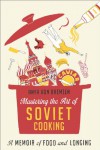Currently reading
Kismetology
On Paper: The Everything of Its Two-Thousand-Year History
Mastering the Art of Soviet Cooking: A Memoir of Food and Longing
The Mirror Lied: One Woman's 25-Year Struggle with Bulimia, Anorexia, Diet Pill Addiction, Laxative Abuse and Cutting.
Where Snowflakes Dance and Swear: Inside the Land of Ballet
Sisterland
Flora
The Old Curiosity Shop
The English Eccentrics
A Short History of Nearly Everything
 This book is quite different from Bryson's usual fare. Here Bryson steps out of his usual travel and language focus to write about science. The product is an interesting combination of the social history of science, biographies of famous scientists, and discussion of significant scientific discoveries in very accessible language. What science does Bryson cover, you might ask? This is where "everything" comes in to the picture. Bryson has chosen a wide range of scientific discoveries, from working out the theory of evolution to discovering the size and shape of the earth. Mostly, Bryson focuses on the largest and smallest things in the universe. He looks at galaxies and volcanoes, but also DNA and atoms. Truly, this book is expansive. For the lay reader, it becomes clear that there's a tremendous amount of knowledge tied up in this book, and it's amazing just how much Bryson had to learn to write it. For the non-scientist, this book manages to create a sense of awe, wonder, and fear, all at the same time. Bryson does an excellent job of highlighting just how surprising and contingent the fact of our existence is, and how complicated it was to get here. He creates amazement as the reader is forced to consider almost unfathomable dimensions, both gargantuan and tiny. Contingency is clearly the most significant theme that emerges from the work. Bryson also paints an interesting portrait of the practice of science, scientific culture, and a sense of just how difficult and tenuous some conclusions are. While it's amazing just how much scientists have discovered, it's even more daunting to consider how much remains inconclusive. Overall, this is an extremely accessible discussion of some difficult topics, infused with Bryson's humor and style. It's a long read, but well worth the effort.
This book is quite different from Bryson's usual fare. Here Bryson steps out of his usual travel and language focus to write about science. The product is an interesting combination of the social history of science, biographies of famous scientists, and discussion of significant scientific discoveries in very accessible language. What science does Bryson cover, you might ask? This is where "everything" comes in to the picture. Bryson has chosen a wide range of scientific discoveries, from working out the theory of evolution to discovering the size and shape of the earth. Mostly, Bryson focuses on the largest and smallest things in the universe. He looks at galaxies and volcanoes, but also DNA and atoms. Truly, this book is expansive. For the lay reader, it becomes clear that there's a tremendous amount of knowledge tied up in this book, and it's amazing just how much Bryson had to learn to write it. For the non-scientist, this book manages to create a sense of awe, wonder, and fear, all at the same time. Bryson does an excellent job of highlighting just how surprising and contingent the fact of our existence is, and how complicated it was to get here. He creates amazement as the reader is forced to consider almost unfathomable dimensions, both gargantuan and tiny. Contingency is clearly the most significant theme that emerges from the work. Bryson also paints an interesting portrait of the practice of science, scientific culture, and a sense of just how difficult and tenuous some conclusions are. While it's amazing just how much scientists have discovered, it's even more daunting to consider how much remains inconclusive. Overall, this is an extremely accessible discussion of some difficult topics, infused with Bryson's humor and style. It's a long read, but well worth the effort.











